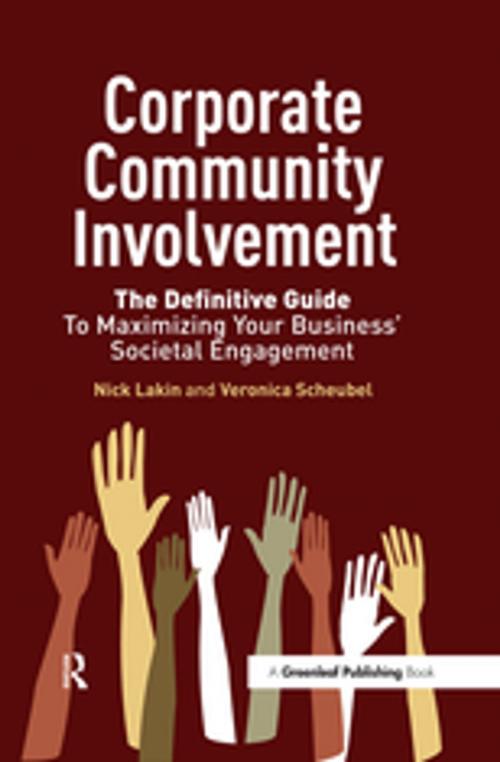Corporate Community Involvement
The Definitive Guide to Maximizing Your Business' Societal Engagement
Business & Finance, Business Reference, Business Ethics, Management & Leadership, Planning & Forecasting| Author: | Nick Lakin, Veronica Scheubel | ISBN: | 9781351279024 |
| Publisher: | Taylor and Francis | Publication: | September 8, 2017 |
| Imprint: | Routledge | Language: | English |
| Author: | Nick Lakin, Veronica Scheubel |
| ISBN: | 9781351279024 |
| Publisher: | Taylor and Francis |
| Publication: | September 8, 2017 |
| Imprint: | Routledge |
| Language: | English |
"We need to do Community Involvement better – we know we're spending millions each year on charitable causes; how can we find out what is really effective and what people will appreciate us for? Who should we partner with? How can we make a real difference in society and help our business?"
Companies around the world are trying to answer these questions. Many are asking the same questions even as, collectively, they continue to spend billions on their communities. How do they know which activities are really worthwhile? Building on the authors' own extensive global experience at Nokia and E.ON, as well as the experience of many other experts in the field, this book offers the first-ever "how to" roadmap for managers on the comprehensive implementation of strategic Community Involvement inside their companies. It is designed to be practical, for those who want to act upon what they have read. It will fill a long-neglected niche as a day-to-day reference guide for practitioners. Corporate Community Involvement demonstrates what to do and how to do it. The advice is backed up by inspiring interviews with best-in-class practitioners from businesses such as Microsoft, GlaxoSmithKline, Ericsson, and Deutsche Bank and leading international Corporate Responsibility and Community Involvement experts.
The book highlights proven best-practice approaches, effective methods, and concise tools to help managers "get there faster" and "get it right first time." The core of the book is a step-by-step guide to developing and implementing a comprehensive and successful approach to Corporate Community Involvement. It shows how to: conduct a current state analysis and devise a strategy, organize staffing and budgets, integrate Corporate Community Involvement throughout the business and create high-profile programs, partner across sectors, measure and evaluate results, communicate successful activities, and overcome challenges. Corporate Community Involvement has an international perspective: the models and principles advocated are adaptable anywhere in the world. Also, it is designed to have as much relevance to a small or medium-sized enterprise as to a multinational.
The book outlines the history and future of Corporate Community Involvement, explaining the business context and why companies need to manage their programs strategically. It also distinguishes between the growing lexicon of terminologies and provides clear definitions of terms such as "philanthropy", "sponsorship", "Corporate Citizenship", "Corporate Responsibility" and "Sustainability", advising when they are appropriate and how each can add value to corporate activities. This will be an indispensible resource for those working at the interface between business and the community. New or developing practitioners will learn from both the successes and failures of those before them. Representatives from other sectors, notably government, international agencies, NGOs, and academia, will come to understand companies' internal requirements for cross-sector collaboration programs in the community better. And students interested in this field will be better equipped to start careers.
"We need to do Community Involvement better – we know we're spending millions each year on charitable causes; how can we find out what is really effective and what people will appreciate us for? Who should we partner with? How can we make a real difference in society and help our business?"
Companies around the world are trying to answer these questions. Many are asking the same questions even as, collectively, they continue to spend billions on their communities. How do they know which activities are really worthwhile? Building on the authors' own extensive global experience at Nokia and E.ON, as well as the experience of many other experts in the field, this book offers the first-ever "how to" roadmap for managers on the comprehensive implementation of strategic Community Involvement inside their companies. It is designed to be practical, for those who want to act upon what they have read. It will fill a long-neglected niche as a day-to-day reference guide for practitioners. Corporate Community Involvement demonstrates what to do and how to do it. The advice is backed up by inspiring interviews with best-in-class practitioners from businesses such as Microsoft, GlaxoSmithKline, Ericsson, and Deutsche Bank and leading international Corporate Responsibility and Community Involvement experts.
The book highlights proven best-practice approaches, effective methods, and concise tools to help managers "get there faster" and "get it right first time." The core of the book is a step-by-step guide to developing and implementing a comprehensive and successful approach to Corporate Community Involvement. It shows how to: conduct a current state analysis and devise a strategy, organize staffing and budgets, integrate Corporate Community Involvement throughout the business and create high-profile programs, partner across sectors, measure and evaluate results, communicate successful activities, and overcome challenges. Corporate Community Involvement has an international perspective: the models and principles advocated are adaptable anywhere in the world. Also, it is designed to have as much relevance to a small or medium-sized enterprise as to a multinational.
The book outlines the history and future of Corporate Community Involvement, explaining the business context and why companies need to manage their programs strategically. It also distinguishes between the growing lexicon of terminologies and provides clear definitions of terms such as "philanthropy", "sponsorship", "Corporate Citizenship", "Corporate Responsibility" and "Sustainability", advising when they are appropriate and how each can add value to corporate activities. This will be an indispensible resource for those working at the interface between business and the community. New or developing practitioners will learn from both the successes and failures of those before them. Representatives from other sectors, notably government, international agencies, NGOs, and academia, will come to understand companies' internal requirements for cross-sector collaboration programs in the community better. And students interested in this field will be better equipped to start careers.















